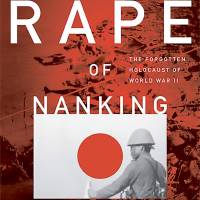Iris Chang's groundbreaking work, "The Rape of Nanking" is widely credited with publicizing the World War II atrocity that many in Japan continue to deny or belittle as exaggeration. Graphically observant to multiple atrocities, it is not a book for the faint-hearted. Despite this, it is immensely readable.
The Rape of Nanking: The Forgotten Holocaust of World War Ⅱ, by Iris Chang.
290 pages
PENGUIN BOOKS, Nonfiction.
While Chang's scholarship has been equally applauded and criticized across the globe, the power of the book comes from her creative efforts to consider multiple perspectives. Throughout, she deliberately considers the event's three main groups of participants: the Japanese military, Chinese residents, and Western observers. The opening chapters walk the reader through the military history that brought Japan to China and explores the viewpoint of the Chinese military and their decision to order the protecting army to retreat, and finally reveals the observations of Western missionaries, professors and even a "Nazi hero" who were witnesses to the slaughter. Chang drew on the diaries, films, and published accounts of those who struggled to aid the local population by setting up the Nanking Safety Zone.
Chang ends the book with "The Forgotten Holocaust: A Second Rape," a section that squarely puts the blame of an academic cover-up for Nanking on Japan. Powerful, painful and a testimony to truth, Chang suffered greatly after revealing the tragedy. Following a nervous breakdown in 2004, she was found dead in an apparent suicide later that year.
Read archived reviews of Japanese essentials at jtimes.jp/essential.

















With your current subscription plan you can comment on stories. However, before writing your first comment, please create a display name in the Profile section of your subscriber account page.